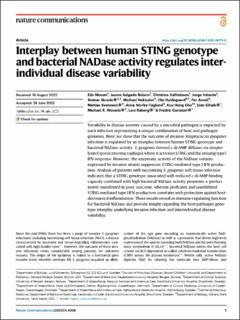| dc.contributor.author | Movert, Elin | |
| dc.contributor.author | Bolarin, Jaume Salgado | |
| dc.contributor.author | Valfridsson, Christine | |
| dc.contributor.author | Velarde, Jorge | |
| dc.contributor.author | Skrede, Steinar | |
| dc.contributor.author | Nekludov, Michael | |
| dc.contributor.author | Hyldegaard, Ole | |
| dc.contributor.author | Arnell, Per | |
| dc.contributor.author | Svensson, Mattias | |
| dc.contributor.author | Norrby-Teglund, Anna | |
| dc.contributor.author | Cho, Kyu Hong | |
| dc.contributor.author | Elhaik, Eran | |
| dc.contributor.author | Wessels, Michael R. | |
| dc.contributor.author | Råberg, Lars | |
| dc.contributor.author | Carlsson, Fredric | |
| dc.date.accessioned | 2024-01-19T08:55:15Z | |
| dc.date.available | 2024-01-19T08:55:15Z | |
| dc.date.created | 2023-09-01T11:52:07Z | |
| dc.date.issued | 2023 | |
| dc.identifier.issn | 2041-1723 | |
| dc.identifier.uri | https://hdl.handle.net/11250/3112693 | |
| dc.description.abstract | Variability in disease severity caused by a microbial pathogen is impacted by each infection representing a unique combination of host and pathogen genomes. Here, we show that the outcome of invasive Streptococcus pyogenes infection is regulated by an interplay between human STING genotype and bacterial NADase activity. S. pyogenes-derived c-di-AMP diffuses via streptolysin O pores into macrophages where it activates STING and the ensuing type I IFN response. However, the enzymatic activity of the NADase variants expressed by invasive strains suppresses STING-mediated type I IFN production. Analysis of patients with necrotizing S. pyogenes soft tissue infection indicates that a STING genotype associated with reduced c-di-AMP-binding capacity combined with high bacterial NADase activity promotes a ‘perfect storm’ manifested in poor outcome, whereas proficient and uninhibited STING-mediated type I IFN production correlates with protection against host-detrimental inflammation. These results reveal an immune-regulating function for bacterial NADase and provide insight regarding the host-pathogen genotype interplay underlying invasive infection and interindividual disease variability. | en_US |
| dc.language.iso | eng | en_US |
| dc.publisher | Nature | en_US |
| dc.rights | Navngivelse 4.0 Internasjonal | * |
| dc.rights.uri | http://creativecommons.org/licenses/by/4.0/deed.no | * |
| dc.title | Interplay between human STING genotype and bacterial NADase activity regulates inter-individual disease variability | en_US |
| dc.type | Journal article | en_US |
| dc.type | Peer reviewed | en_US |
| dc.description.version | publishedVersion | en_US |
| dc.rights.holder | Copyright 2023 The Author(s) | en_US |
| dc.source.articlenumber | 4008 | en_US |
| cristin.ispublished | true | |
| cristin.fulltext | original | |
| cristin.qualitycode | 2 | |
| dc.identifier.doi | 10.1038/s41467-023-39771-0 | |
| dc.identifier.cristin | 2171621 | |
| dc.source.journal | Nature Communications | en_US |
| dc.identifier.citation | Nature Communications. 2023, 14 (1), 4008. | en_US |
| dc.source.volume | 14 | en_US |
| dc.source.issue | 1 | en_US |

